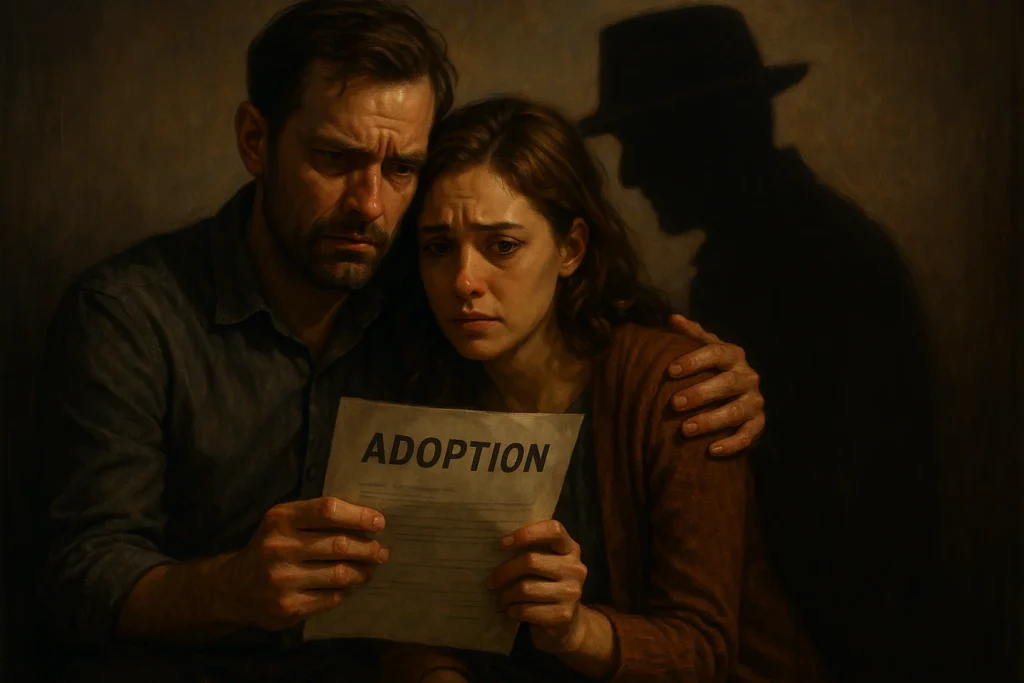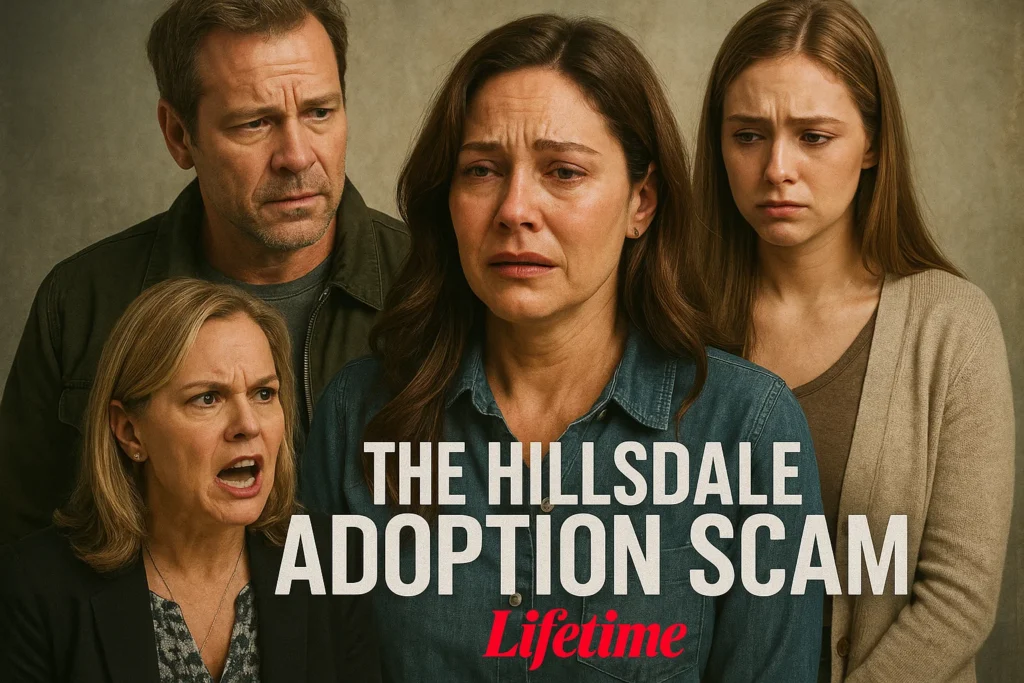
In this breakdown, we’ll explore the film’s plot, the cast who brought it to the screen, its shocking ending, and, most importantly, whether it’s truly based on real events. Along the way, we’ll touch on the broader issue of adoption scams and how families can protect themselves when pursuing one of life’s most meaningful decisions.
What Is the Hillsdale Adoption Scam True Story?
The film, released in 2023 on Lifetime, follows Bethany and her husband Terrence as they attempt to adopt a child. After years of longing, the couple finally connects with a young pregnant woman who appears willing to let them adopt her baby. What begins as a moment of joy soon unravels into a web of lies, deceit, and emotional manipulation.
The “scam” centers on a manipulative scheme where desperate hopeful parents are preyed upon by someone posing as a legitimate expectant mother. The story mirrors very real cases across the United States, where adoption fraud has left families financially drained and emotionally devastated.
While the movie itself is dramatized, it’s not entirely fiction. The Hillsdale Adoption Scam is “inspired by true events” rather than a documentary about a single case. It borrows elements from several high-profile adoption scams reported in recent years, stories of vulnerable parents being misled by false promises, fake agencies, and fraudulent adoption facilitators.
The Hillsdale Adoption Scam Cast and Performances
Casting plays a crucial role in Lifetime thrillers, and this one is no exception.
Keshia Knight Pulliam stars as Bethany, the hopeful adoptive mother whose heartbreak and determination carry much of the emotional weight of the film. Her performance is deeply relatable, viewers can feel her mixture of hope, vulnerability, and resilience.
Michael Strickland portrays Terrence, Bethany’s supportive husband. His character embodies the frustration many spouses feel when the family dream collides with betrayal.
Danielle LaRoach takes on the role of Georgia, the mysterious young woman at the heart of the scam. Her performance perfectly balances innocence and menace, leaving audiences questioning her motives at every turn.
The chemistry between the cast is palpable. Together, they create a sense of raw tension that makes the movie more than just another Lifetime thriller, it becomes a chilling reminder of how scams prey on trust and human longing.

The Hillsdale Adoption Scam Ending Explained
The movie’s climax is both tense and heartbreaking. As Bethany and Terrence uncover the truth about Georgia’s deception, the pieces of the scam fall into place. Their financial loss is painful, but the emotional betrayal cuts deeper.
The ending highlights two key truths:
Adoption scams don’t just steal money, they shatter dreams.
Justice is complicated in cases like this, because the emotional harm often outweighs the criminal punishment.
In the final scenes, Bethany and Terrence are left to rebuild their trust and pursue their family dream with greater caution. The resolution isn’t neat or easy, and that’s intentional. It reflects the reality that adoption journeys are rarely smooth, and scams leave scars that take years to heal.
Is the Hillsdale Adoption Scam Based on a True Story?
This is the question that most viewers ask. The answer is: yes and no.
Yes, the movie is inspired by true adoption fraud cases. Reports across the U.S. show numerous instances where families were tricked by individuals posing as expectant mothers. In some cases, multiple families were scammed by the same individual.
No, the film doesn’t follow a single “Hillsdale” case. The town of Hillsdale is fictional, and the movie’s events are dramatized for storytelling.
Lifetime often produces films labeled as “ripped from the headlines.” These stories blend factual inspiration with fictionalized dialogue, characters, and settings. The Hillsdale Adoption Scam fits squarely in that tradition.
How to Know If an Adoption Agency Is Legit
The film may be fictionalized, but the warning it delivers is very real. Adoption scams can happen anywhere, and hopeful parents need tools to protect themselves. Here are some ways to check legitimacy:
Verify licensing: In the U.S., adoption agencies must be licensed by state authorities. Always check with your state’s Department of Health and Human Services.
Avoid unregulated facilitators: Some scammers pose as “independent adoption facilitators.” If they are not licensed, that’s a red flag.
Check reviews and complaints: Look up the agency on the Better Business Bureau (BBB) and state attorney general’s office.
Trust your instincts: If someone pressures you to send money quickly or refuses to provide clear documents, walk away.
Legal support: Always work with an adoption attorney who can confirm the legitimacy of paperwork and protect your rights.
The emotional stakes in adoption make families vulnerable. Scammers exploit that vulnerability, but awareness can prevent heartbreak.
Reviews: IMDb, Lifetime, and Rotten Tomatoes
The movie has received mixed but engaged reviews across platforms:
IMDb – Viewers describe it as suspenseful and emotional, with a 6/10 rating. Many highlight Keshia Knight Pulliam’s performance as a standout.
Rotten Tomatoes – While not widely reviewed by critics, audience responses note the film’s ability to blend thriller elements with emotional storytelling.
Lifetime’s audience – The network promoted the film as part of its ongoing slate of “true story inspired” thrillers. Fans of the channel’s dramatic style appreciated the balance of tension and humanity.
The reception mirrors what often happens with Lifetime dramas: critics may view them as formulaic, but audiences value the emotional punch and relatable social issues.
Where to Watch the Hillsdale Adoption Scam
If you missed its original airing, The Hillsdale Adoption Scam is available through:
Lifetime’s official website – Often features full replays or clips for U.S. audiences.
Lifetime Movie Club – The streaming service offers access to Lifetime originals, including this film.
Amazon Prime & other digital platforms – Lifetime films are frequently licensed for digital purchase or rental.
Always check your regional streaming availability, as Lifetime content varies outside the U.S.
The Broader Issue: Real-Life Adoption Scams
The Lifetime film may be fiction, but real families face this nightmare every year. Adoption scams can involve:
Individuals pretending to be pregnant and promising a baby for adoption.
Fake agencies charging thousands in fees with no intention of delivering legitimate services.
Cases where multiple families are led to believe they are adopting the same child.
According to the National Council for Adoption, financial losses can reach tens of thousands of dollars. But the greatest loss is emotional, parents left grieving for a child they never met, and birth mothers whose identities are stolen for fraud.
Final Thoughts on the Hillsdale Adoption Scam
The Hillsdale Adoption Scam may not depict a single true case, but its impact lies in how it echoes real pain. By dramatizing the emotional rollercoaster of adoption fraud, it shines a light on a hidden but significant social issue.
For viewers, the film is both entertainment and a cautionary tale. It reminds us that trust is precious, scams are real, and hope can sometimes cloud judgment.
As Bethany and Terrence’s story closes on screen, the bigger story continues in real life. Families still dream of adoption. Scammers still prey on them. And stories like The Hillsdale Adoption Scam push us to ask harder questions, check deeper facts, and protect what matters most: the love at the heart of family.

Jessica Savitch, with a deep passion for journalism, brings her expertise to istruestory.com as a dedicated author. MA in Arts & Journalism.